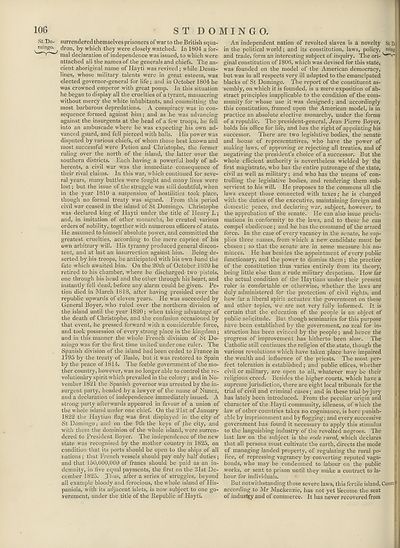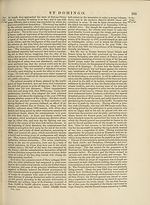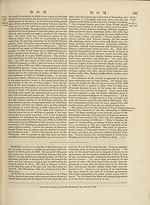Encyclopaedia Britannica > Volume 8, DIA-England
(116) Page 106
Download files
Complete book:
Individual page:
Thumbnail gallery: Grid view | List view

ST DOMINGO.
106
St Do- surrendered themselves prisoners of war to the British squa-
mingo. ^ dron, by which they were closely watched. In 1804 a for-
mai declaration of independence was issued, to which were
attached all the names of the generals and chiefs. The an¬
cient aboriginal name of Hayti was revived; while Dessa-
lines, whose military talents were in great esteem, was
elected governor-general for life ; and in October 1804 he
was crowned emperor with great pomp. In this situation
he began to display all the cruelties of a tyrant, massacring
without mercy the white inhabitants, and committing the
most barbarous depredations. A conspiracy was in con¬
sequence formed against him; and as he was advancing
against the insurgents at the head of a few troops, he fell
into an ambuscade where he was expecting his own ad¬
vanced guard, and fell pierced with balls. His power was
disputed by various chiefs, of whom those best known and
most successful were Petion and Christophe, the former
ruling over the north of the island, the latter over the
southern districts. Each having a powerful body of ad¬
herents, a civil war was the immediate consequence of
their rival claims. In this war, which continued for seve¬
ral years, many battles were fought and many lives were
lost; but the issue of the struggle was still doubtful, when
in the year 1810 a suspension of hostilities took place,
though no formal treaty was signed. From this period
civil war ceased in the island of St Domingo. Christophe
was declared king of Hayti under the title of Henry I.;
and, in imitation of other monarchs, he created various
orders of nobility, together with numerous officers of state.
He assumed to himself absolute power, and committed the
greatest cruelties, according to the mere caprice of his
own arbitrary will. His tyranny produced general discon¬
tent, and at last an insurrection against him. Being de¬
serted by his troops, he anticipated with his own hand the
fate which awaited him. On the 20th of October 1820 he
retired to his chamber, where he discharged- two pistols,
one through his head and the other through his heart, and
instantly fell dead, before any alarm could be given. Pe¬
tion died in March 1818, after having presided over the
republic upwards of eleven years. He was succeeded by
General Boyer, who ruled over the northern division of
the island until the year 1820; when taking advantage of
the death of Christophe, and the confusion occasioned by
that event, he pressed forward with a considerable force,
and took possession of every strong place in the kingdom ;
and in this manner the whole French division of St Do¬
mingo was for the first time united under one ruler. The
Spanish division of the island had been ceded to France in
1795 by the treaty of Basle, but it was restored to Spain
by the peace of 1814. The feeble government of the mo¬
ther country, however, was no longer able to control the re¬
volutionary spirit which prevailed in the colony ; and in No¬
vember 1821 the Spanish governor was arrested by the in¬
surgent party, headed by a lawyer of the name of Nunez,
and a declaration of independence immediately issued. A
strong party afterwards appeared in favour of a union of
the whole island under one chief. On the 21st of January
1822 the Haytian flag was first displayed in the city of
St Domingo; and on the 9th the keys of the city, and
with them the dominion of the whole island, vrere surren¬
dered to President Boyer. The independence of the new
state was recognised by the mother country in 1825, on
condition that its ports should be open to the ships of all
nations ; that French vessels should pay only half duties ;
and that 150,000,000 of francs should be paid as an in¬
demnity, in five equal payments, the first on the 31st De¬
cember 1825. Thus, after a series of struggles, beyond
all example bloody and ferocious, the whole island of His¬
paniola, with its adjacent islets, is now subject to one go¬
vernment, under the title of the Republic of Playti.
An independent nation of revolted slaves is a novelty St D.
in the political world; and its constitution, laws, policy, wing
and trade, form an interesting subject of inquiry. The ori-
ginal constitution of 1806, which was devised for this state,
was founded on the model of the American democracy,
but was in all respects very ill adapted to the emancipated
blacks of St Domingo. The report of the constituent as¬
sembly, on which it is founded, is a mere exposition of ab¬
stract principles inapplicable to the condition of the com¬
munity for whose use it was designed; and accordingly
this constitution, framed upon the American model, is in
practice an absolute elective monarchy, under the forms
of a republic. The president-general, Jean Pierre Boyer,
holds his office for life, and has the right of appointing his
successor. There are two legislative bodies, the senate
and house of representatives, who have the power of
making laws, of approving or rejecting all treaties, and of
negativing the president’s choice of a successor. But the
whole efficient authority is nevertheless wielded by the
first magistrate, who has the entire patronage of the state,
civil as well as military; and who has the means of con¬
trolling the legislative bodies, and rendering them sub¬
servient to his will. He proposes to the commons all the
laws except those connected with taxes; he is charged
with the duties of the executive, maintaining foreign and
domestic peace, and declaring war, subject, however, to
the approbation of the senate. Fie can also issue procla¬
mations in conformity to the laws, and to these he can
compel obedience ; and he has the command of the armed
force. In the case of every vacancy in the senate, he sup¬
plies three names, from which a new candidate must be
chosen; so that the senate are in some measure his no¬
minees. He has besides the appointment of every public
functionary, and the power to dismiss them; the practice
of the constitution thus varies entirely from its theory,
being little else than a rude military despotism. How far
the actual condition of the Haytians under their present
ruler is comfortable or otherwise, whether the laws are
duly administered for the protection of civil rights, and
how far a liberal spirit actuates the government on these
and other topics, we are not very fully informed. It is
certain that the education of the people is an object of
public solicitude. But though seminaries for this purpose
have been established by the government, no zeal for in¬
struction has been evinced by the people; and hence the
progress of improvement has hitherto been slow\ The
Catholic still continues the religion of the state, though the
various revolutions which have taken place have impaired
the wealth and influence of the priests. The most per¬
fect toleration is established; and public offices, whether
civil or military, are open to all, whatever may be their
religious creed. Besides the higher courts, which have a
supreme jurisdiction, there are eight local tribunals for the
trial of civil and criminal cases ; and in these trial by jury
has lately been introduced. From the peculiar origin and
character of the Flayti community, idleness, of which the
law of other countries takes no cognisance, is here punish¬
able by imprisonment and by flogging; and every successive
government has found it necessary to apply tins stimulus
to the languishing industry of the revolted negroes. The
last law on the subject is the code rural, which declares
that all persons must cultivate the earth, directs the mode
of managing landed property, of regulating the rural po¬
lice, of repressing vagrancy by converting reputed vaga¬
bonds, who may be condemned to labour on the public
works, or sent to prison until they make a contract to la¬
bour for individuals.
But notwithstanding those severe laws, this fertile island, Comm
according to Mr Mackenzie, has not yet become the seat
of industry and of commerce. It has never recovered from
106
St Do- surrendered themselves prisoners of war to the British squa-
mingo. ^ dron, by which they were closely watched. In 1804 a for-
mai declaration of independence was issued, to which were
attached all the names of the generals and chiefs. The an¬
cient aboriginal name of Hayti was revived; while Dessa-
lines, whose military talents were in great esteem, was
elected governor-general for life ; and in October 1804 he
was crowned emperor with great pomp. In this situation
he began to display all the cruelties of a tyrant, massacring
without mercy the white inhabitants, and committing the
most barbarous depredations. A conspiracy was in con¬
sequence formed against him; and as he was advancing
against the insurgents at the head of a few troops, he fell
into an ambuscade where he was expecting his own ad¬
vanced guard, and fell pierced with balls. His power was
disputed by various chiefs, of whom those best known and
most successful were Petion and Christophe, the former
ruling over the north of the island, the latter over the
southern districts. Each having a powerful body of ad¬
herents, a civil war was the immediate consequence of
their rival claims. In this war, which continued for seve¬
ral years, many battles were fought and many lives were
lost; but the issue of the struggle was still doubtful, when
in the year 1810 a suspension of hostilities took place,
though no formal treaty was signed. From this period
civil war ceased in the island of St Domingo. Christophe
was declared king of Hayti under the title of Henry I.;
and, in imitation of other monarchs, he created various
orders of nobility, together with numerous officers of state.
He assumed to himself absolute power, and committed the
greatest cruelties, according to the mere caprice of his
own arbitrary will. His tyranny produced general discon¬
tent, and at last an insurrection against him. Being de¬
serted by his troops, he anticipated with his own hand the
fate which awaited him. On the 20th of October 1820 he
retired to his chamber, where he discharged- two pistols,
one through his head and the other through his heart, and
instantly fell dead, before any alarm could be given. Pe¬
tion died in March 1818, after having presided over the
republic upwards of eleven years. He was succeeded by
General Boyer, who ruled over the northern division of
the island until the year 1820; when taking advantage of
the death of Christophe, and the confusion occasioned by
that event, he pressed forward with a considerable force,
and took possession of every strong place in the kingdom ;
and in this manner the whole French division of St Do¬
mingo was for the first time united under one ruler. The
Spanish division of the island had been ceded to France in
1795 by the treaty of Basle, but it was restored to Spain
by the peace of 1814. The feeble government of the mo¬
ther country, however, was no longer able to control the re¬
volutionary spirit which prevailed in the colony ; and in No¬
vember 1821 the Spanish governor was arrested by the in¬
surgent party, headed by a lawyer of the name of Nunez,
and a declaration of independence immediately issued. A
strong party afterwards appeared in favour of a union of
the whole island under one chief. On the 21st of January
1822 the Haytian flag was first displayed in the city of
St Domingo; and on the 9th the keys of the city, and
with them the dominion of the whole island, vrere surren¬
dered to President Boyer. The independence of the new
state was recognised by the mother country in 1825, on
condition that its ports should be open to the ships of all
nations ; that French vessels should pay only half duties ;
and that 150,000,000 of francs should be paid as an in¬
demnity, in five equal payments, the first on the 31st De¬
cember 1825. Thus, after a series of struggles, beyond
all example bloody and ferocious, the whole island of His¬
paniola, with its adjacent islets, is now subject to one go¬
vernment, under the title of the Republic of Playti.
An independent nation of revolted slaves is a novelty St D.
in the political world; and its constitution, laws, policy, wing
and trade, form an interesting subject of inquiry. The ori-
ginal constitution of 1806, which was devised for this state,
was founded on the model of the American democracy,
but was in all respects very ill adapted to the emancipated
blacks of St Domingo. The report of the constituent as¬
sembly, on which it is founded, is a mere exposition of ab¬
stract principles inapplicable to the condition of the com¬
munity for whose use it was designed; and accordingly
this constitution, framed upon the American model, is in
practice an absolute elective monarchy, under the forms
of a republic. The president-general, Jean Pierre Boyer,
holds his office for life, and has the right of appointing his
successor. There are two legislative bodies, the senate
and house of representatives, who have the power of
making laws, of approving or rejecting all treaties, and of
negativing the president’s choice of a successor. But the
whole efficient authority is nevertheless wielded by the
first magistrate, who has the entire patronage of the state,
civil as well as military; and who has the means of con¬
trolling the legislative bodies, and rendering them sub¬
servient to his will. He proposes to the commons all the
laws except those connected with taxes; he is charged
with the duties of the executive, maintaining foreign and
domestic peace, and declaring war, subject, however, to
the approbation of the senate. Fie can also issue procla¬
mations in conformity to the laws, and to these he can
compel obedience ; and he has the command of the armed
force. In the case of every vacancy in the senate, he sup¬
plies three names, from which a new candidate must be
chosen; so that the senate are in some measure his no¬
minees. He has besides the appointment of every public
functionary, and the power to dismiss them; the practice
of the constitution thus varies entirely from its theory,
being little else than a rude military despotism. How far
the actual condition of the Haytians under their present
ruler is comfortable or otherwise, whether the laws are
duly administered for the protection of civil rights, and
how far a liberal spirit actuates the government on these
and other topics, we are not very fully informed. It is
certain that the education of the people is an object of
public solicitude. But though seminaries for this purpose
have been established by the government, no zeal for in¬
struction has been evinced by the people; and hence the
progress of improvement has hitherto been slow\ The
Catholic still continues the religion of the state, though the
various revolutions which have taken place have impaired
the wealth and influence of the priests. The most per¬
fect toleration is established; and public offices, whether
civil or military, are open to all, whatever may be their
religious creed. Besides the higher courts, which have a
supreme jurisdiction, there are eight local tribunals for the
trial of civil and criminal cases ; and in these trial by jury
has lately been introduced. From the peculiar origin and
character of the Flayti community, idleness, of which the
law of other countries takes no cognisance, is here punish¬
able by imprisonment and by flogging; and every successive
government has found it necessary to apply tins stimulus
to the languishing industry of the revolted negroes. The
last law on the subject is the code rural, which declares
that all persons must cultivate the earth, directs the mode
of managing landed property, of regulating the rural po¬
lice, of repressing vagrancy by converting reputed vaga¬
bonds, who may be condemned to labour on the public
works, or sent to prison until they make a contract to la¬
bour for individuals.
But notwithstanding those severe laws, this fertile island, Comm
according to Mr Mackenzie, has not yet become the seat
of industry and of commerce. It has never recovered from
Set display mode to:
![]() Universal Viewer |
Universal Viewer | ![]() Mirador |
Large image | Transcription
Mirador |
Large image | Transcription
Images and transcriptions on this page, including medium image downloads, may be used under the Creative Commons Attribution 4.0 International Licence unless otherwise stated. ![]()
| Encyclopaedia Britannica > Encyclopaedia Britannica > Volume 8, DIA-England > (116) Page 106 |
|---|
| Permanent URL | https://digital.nls.uk/193324513 |
|---|
| Attribution and copyright: |
|
|---|
| Description | Ten editions of 'Encyclopaedia Britannica', issued from 1768-1903, in 231 volumes. Originally issued in 100 weekly parts (3 volumes) between 1768 and 1771 by publishers: Colin Macfarquhar and Andrew Bell (Edinburgh); editor: William Smellie: engraver: Andrew Bell. Expanded editions in the 19th century featured more volumes and contributions from leading experts in their fields. Managed and published in Edinburgh up to the 9th edition (25 volumes, from 1875-1889); the 10th edition (1902-1903) re-issued the 9th edition, with 11 supplementary volumes. |
|---|---|
| Additional NLS resources: |
|

